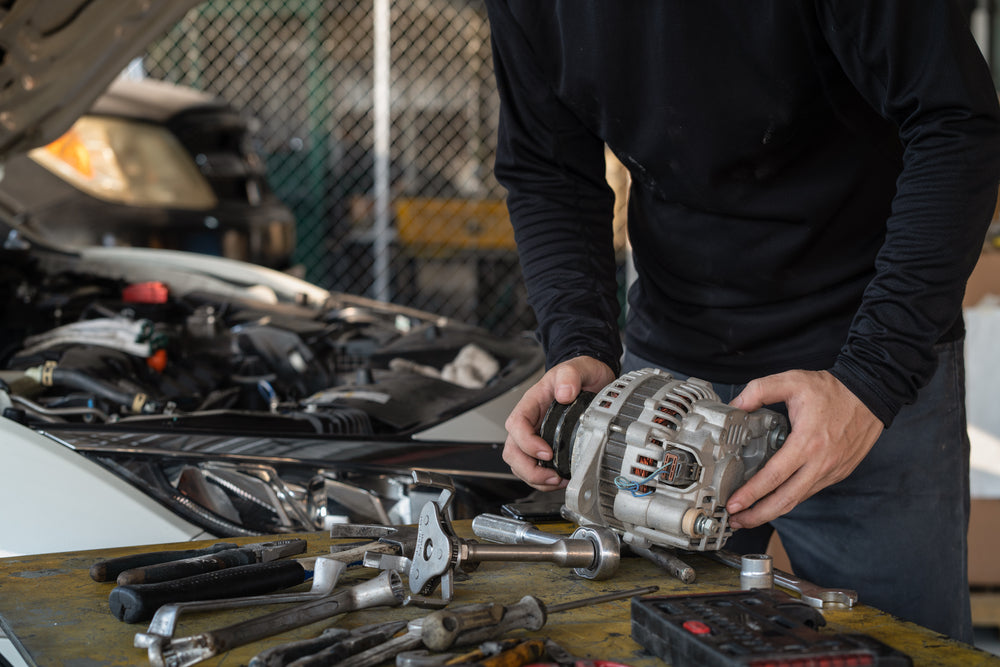Time's Up: Signs It's Time to Replace Your Alternator
You know your car's alternator is there to keep the battery charged and power everything in your vehicle when the engine's running, but what do you really know about this important car part? You might think that you don't need to worry about it because it starts working when you turn the key in the ignition.
But just like other electrical components of a car, they're prone to damage from faulty wiring or short circuits. Once that happens, it can cause your battery to lose power much sooner than usual. If ignored for too long, faulty alternators can render your vehicle immobile until you replace them with a new one.
What Is An Alternator?
A car alternator is a device that uses magnetism to generate electrical current. The large, round metal objects bolted onto the front of an engine are usually called generators. Typically, they produce electricity for running vehicle lighting and accessories (hence the name "alternator").
But if you look very closely near where they are attached to your car's engine block, you can see smaller devices tucked in between them called voltage regulators. These gadgets convert the electricity produced by the alternator into voltages that will be used by most of your car's components.
Things That Cause Alternator Wear
The electrical system on your vehicle is responsible for powering numerous things, ranging from the ignition switch to all of your lights. It can be an essential part of your vehicle's operation, but it can become worn down and fail if not maintained properly.
One of the biggest culprits that cause alternator wear is plugged into your cigarette lighter or powerpoint - things like cell phone chargers, portable stereos, radar detectors, etc.
When these items are used frequently, they draw more amperage than the charging system was designed to provide. Usually, this isn't a problem since they work off small batteries that operate the device until the battery runs out of power, at which point it will recharge using current from the vehicle.
If the vehicle is running, they draw power from the battery instead of the alternator. This prevents damage to both devices by preventing overcharging and draining of the batteries. However, if you have these things plugged in while you aren't driving, they will continue to drain your battery until it goes dead, at which point what do you think will happen?
That's right! The alternator will no longer charge your batteries but continue to run them down further until, eventually, one or both fail.
Some other significant causes are:
- Dirty/clogged air filters restrict airflow through the engine compartment, resulting in reduced voltage generated by the alternator.
- Faulty ignition modules that prevent proper firing of cylinders, thus reducing output on some cylinders.
- Low fuel pressure.
- Bad grounds.
- Poor connections or corrosion on battery terminals.
Signs It's Time to Replace Your Alternator
Driving around in your car and everything seems to be going just fine - everything but the radio, that is. Suddenly it goes quiet, and you know something's wrong. You take a look under the hood and realize what's happening: Your alternator is not working anymore, and there's no electrical power left in your battery.
If only you had heard about it earlier! But now you're stuck with a dead battery and need to get it replaced as soon as possible to get back on the road again.

Here are some signs you should know when its time to replace your alternator:
You're Getting Unexpected Battery Drain
If your car's battery is losing its charge much faster than usual, that means the alternator isn't doing its job as it should. When that happens, you can either disconnect the battery or have it replaced with a new one and see if your old alternator can still hold a charge after driving for another day.
If not, then it would be time to get a replacement. When this happens, you might also notice dimming headlights and a slow engine crank - both signs you need a new alternator ASAP!
Your Vehicle Struggles on Steep Hills or Commutes
The alternator helps power the vehicle's electric components and accessories, so if it's faulty, you can expect that your car won't be as efficient in high RPMs.
If you live in a very hilly area with steep roads often or commute long distances to work daily where lots of stop-and-go traffic is involved, your car will drain its battery much quicker than usual. This means it's time for a new alternator.
Your Vehicle Shuts Off While Driving
Aside from leaving you stranded in the middle of nowhere, this particular problem could also indicate several other things wrong with your car: worn-out fuses and wiring harnesses, corroded battery terminals that interrupt your power connection, or a faulty alternator belt.
In any of these situations, it's best to have a mechanic inspect your alternator and batteries to know precisely what's causing the problem.
There Are Noises That Concern You When You Start Your Engine or Go Into Gear
Noise is a sign something isn't working right, so if you hear a clicking sound when you turn on the ignition or while driving in gear, the chances are that there's an electrical issue with your vehicle.
Even though it doesn't necessarily mean that it's your alternator making those noises, at least not all the time, it would be wise for you to get more information about what could be wrong before starting up your car again.
A few clicks might not bother some people too much, but if it's a constant sound or multiple sounds you don't recognize, it might be wise to get an inspection from a mechanic right away.
You Haven't Changed Your Alternator for Years and Replaced Other Parts Instead
There could be many reasons why your car battery is prone to early draining and failing, one of which could be because the alternator hasn't been replaced in years and has already gone past its lifespan. Getting other parts checked out while you're at it would also keep you safe on the road and help prevent bigger problems down the road.
So even if you've managed to get high mileage without changing your alternator so far, getting a new one would still be recommended once all other components are ruled out as the problem.
It is most likely that your alternator will begin to fail if you are experiencing any of these symptoms, but getting it checked by a mechanic will confirm whether or not this is the case.


